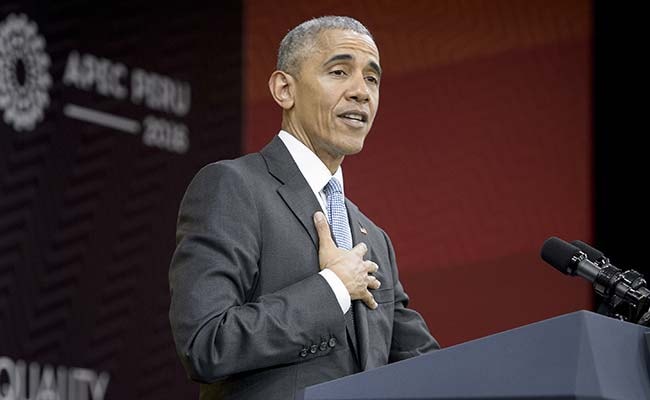
Barack Obama had decided to preserve the report in his archives instead. (File Photo)
Washington:
President Barack Obama on Monday turned down a request from some senators to declassify a Senate report documenting the CIA's harsh treatment of detainees after 9/11.
As the end of Obama's presidency approaches, a number of senators have urged him to declassify the 6,770-page investigation so that the public can have a full accounting of past torture practices. But White House counsel Neil Eggleston said Obama had decided to preserve the report in his archives instead.
Eggleston, in a letter to Sen. Dianne Feinstein released by the California Democrat's office, said Obama had told the National Archives and Records Administration that access to classified material should be shielded from public access requests for 12 years, the full period allowed by the Presidential Records Act. After 12 years, a records request to Obama's archives would prompt a process to consider declassification.
"At this time, we are not pursuing declassification of the full study," Eggleston wrote.
Feinstein, who spearheaded the five-year investigation and is the top Democrat on the Senate's intelligence panel, said she was pleased that Obama was preserving it in his archives, but acknowledged he was rejecting the request for its immediate declassification.
"It's my very strong belief that one day this report should be declassified," Feinstein said. "This must be a lesson learned: that torture doesn't work."
Although the full report remains classified, a 525-page executive summary was released in late 2014. The summary cited CIA documents in determining the interrogation program was more brutal than previously understood and didn't produce unique intelligence that couldn't have been obtained through regular interrogation techniques.
Sen. Ron Wyden, D-Ore., another proponent for releasing the report, said he would start "on the very first day of the new session building a bipartisan coalition to get the study declassified." That effort is likely to run into opposition from President-elect Donald Trump, who has wavered on the effectiveness of torture, but vowed at one point in his campaign to bring back harsh interrogation techniques.
Trump's pick to run the CIA, GOP Rep. Mike Pompeo, rejected the accusations in the report when the summary was released in 2014, arguing the CIA officials who carried out the interrogations "are not torturers, they are patriots." Feinstein has said she plans to confront Pompeo about those remarks during his confirmation hearings next year.
(This story has not been edited by NDTV staff and is auto-generated from a syndicated feed.)
As the end of Obama's presidency approaches, a number of senators have urged him to declassify the 6,770-page investigation so that the public can have a full accounting of past torture practices. But White House counsel Neil Eggleston said Obama had decided to preserve the report in his archives instead.
Eggleston, in a letter to Sen. Dianne Feinstein released by the California Democrat's office, said Obama had told the National Archives and Records Administration that access to classified material should be shielded from public access requests for 12 years, the full period allowed by the Presidential Records Act. After 12 years, a records request to Obama's archives would prompt a process to consider declassification.
"At this time, we are not pursuing declassification of the full study," Eggleston wrote.
Feinstein, who spearheaded the five-year investigation and is the top Democrat on the Senate's intelligence panel, said she was pleased that Obama was preserving it in his archives, but acknowledged he was rejecting the request for its immediate declassification.
"It's my very strong belief that one day this report should be declassified," Feinstein said. "This must be a lesson learned: that torture doesn't work."
Although the full report remains classified, a 525-page executive summary was released in late 2014. The summary cited CIA documents in determining the interrogation program was more brutal than previously understood and didn't produce unique intelligence that couldn't have been obtained through regular interrogation techniques.
Sen. Ron Wyden, D-Ore., another proponent for releasing the report, said he would start "on the very first day of the new session building a bipartisan coalition to get the study declassified." That effort is likely to run into opposition from President-elect Donald Trump, who has wavered on the effectiveness of torture, but vowed at one point in his campaign to bring back harsh interrogation techniques.
Trump's pick to run the CIA, GOP Rep. Mike Pompeo, rejected the accusations in the report when the summary was released in 2014, arguing the CIA officials who carried out the interrogations "are not torturers, they are patriots." Feinstein has said she plans to confront Pompeo about those remarks during his confirmation hearings next year.
(This story has not been edited by NDTV staff and is auto-generated from a syndicated feed.)
Track Latest News Live on NDTV.com and get news updates from India and around the world

